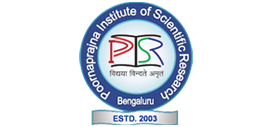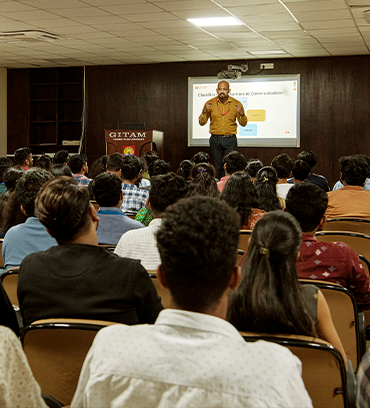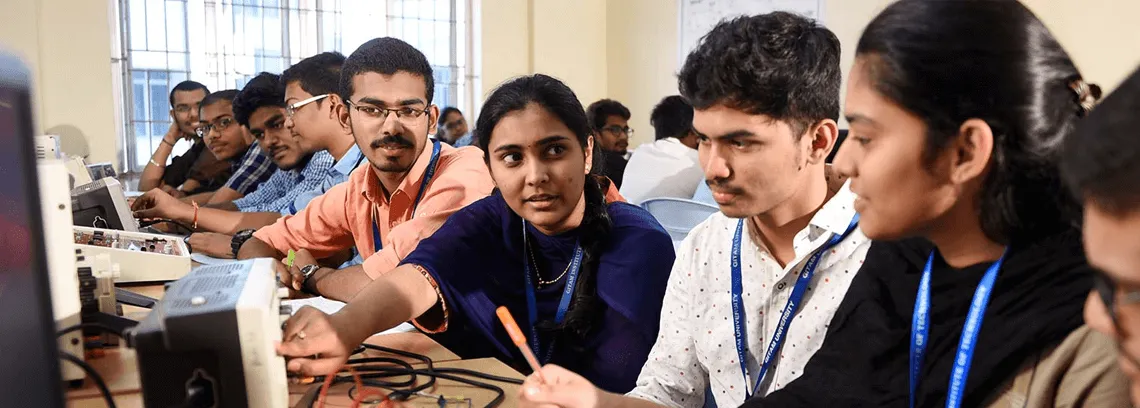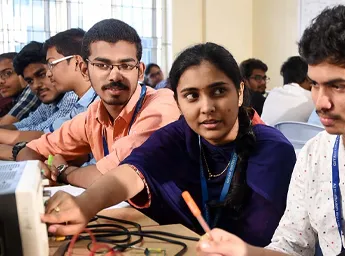PhD Electronics
GITAM's Doctor of Philosophy (PhD) in Electronics is an elite programme designed for those aiming to advance their research capabilities and contribute to groundbreaking developments in the field of electronics. Offered at our Bengaluru campus, this programme provides an unparalleled opportunity to engage in in-depth research and specialised study, addressing complex challenges and exploring innovative solutions.
Delivered by the Department of Electronics, the PhD programme builds on advanced knowledge and research methodologies, focusing on cutting-edge topics. Students will work closely with leading faculty members, engaging in high-impact research projects and contributing to significant scientific and technological advancements.
The programme is structured to enhance critical thinking and problem-solving skills, bridging theoretical concepts with practical research applications. PhD candidates will have access to state-of-the-art laboratories and research facilities, preparing them to excel in roles such as research leaders, technology developers, and academic scholars within the global electronics industry.

Eligibility
The PhD Electronics programme is open to applicants with a Master’s degree in Physics, Electronic Science, Electronics, Instrumentation, or other equivalent degrees.
Scope of the Programme
The PhD in Electronics programme is designed for those aiming to push the boundaries of knowledge and innovation in the field of electronics. This advanced programme provides students with the opportunity to engage in cutting-edge research, focusing on complex areas such as microelectronics, embedded systems, advanced circuit design, and next-generation communication technologies.
Graduates of the PhD programme will be equipped to lead pioneering research projects, drive technological advancements, and contribute significantly to academic and industrial developments. The programme's rigorous approach ensures that students gain deep theoretical insights and hands-on research experience.
completion, PhD graduates are well-prepared to make impactful contributions to diverse sectors including telecommunications, information technology, consumer electronics, automotive systems, aerospace engineering, and industrial automation. Their expertise will enable them to address complex challenges, shape future technologies, and lead advancements in the global electronics industry.
Key Highlights
Application Domain Experience of Faculty
- IoT Devices
- Sensor Technology
- Non-Destructive Testing
- Semiconductor Technology
- VLSI
- Medical Technology
Centres of Excellence & Infrastructure
- DST FIST – Physics Research Lab
Research Centre
- MURTI Multidisciplinary Research
- Access to state-of-the-art research facilities
- MURTI Excellence Fellowship (₹40,000) & GITAM Junior Fellowship (₹25,000) per month for three years (meritorious candidates)
- Collaborate with national and international experts
- Support for publications and conference participation
- Regular doctoral webinars and workshops
- Access to resources: e-journals, Coursera, Grammarly, digital library
Industry & Academic Collaborations
- AMTZ
- Panacea Medical Technologies
- AcenAAr Technologies
- Pallet Services
- Coventen Industrial Solutions
Syllabus
The curriculum has been collaboratively designed by experts from prestigious institutions like IITs, ISERs, UoH, and BHU, in alignment with the National Education Policy 2020.
Career Options
A PhD in Electronics positions you at the cutting edge of technological innovation, allowing you to lead transformative research and development in a wide array of high-impact sectors. With advanced expertise, PhD graduates are key contributors to the development and optimisation of sophisticated electronic systems and technologies that drive progress across industries.
From pioneering research in telecommunications and healthcare to advancing automation, consumer electronics, and aerospace technologies, your specialised knowledge will be instrumental in pushing the boundaries of what is possible.
India's rapidly growing electronics and telecommunications industry, projected to reach $400 billion by 2025, presents extensive opportunities for PhD graduates. This growth, driven by advancements in IoT, artificial intelligence, renewable energy, and other emerging fields, underscores the demand for experts capable of leading groundbreaking projects and innovations.
Are you ready to drive the future of technology and make a significant impact in the field of electronics?
Here are some exciting career paths to consider:
- Lead Research Scientist
- Principal Electronics Engineer
- Director of Technology
- Senior Systems Architect
- Chief Innovation Officer
- Head of R&D
- Electronics and Communication Consultant
- University Professor and Research Scholar
Star Recruiters

Notable Alumni
Infrastructure and Facilities







Fee Structure
Ph.D Electronics
| PhD Mode of Admission | Duration | Application Fee | Annual Fee | Processing Fee (Only one time) |
|---|---|---|---|---|
| Full-Time (Indian Nationals) | 3 Years | INR 1,200 | INR 30,000 | NIL |
| Full-Time (Foreign Nationals) | 3 Years | NIL | USD 2,500 | USD 300 |
| Extramural | 4 Years | INR 1,200 | INR 1,00,000 | NIL |


























